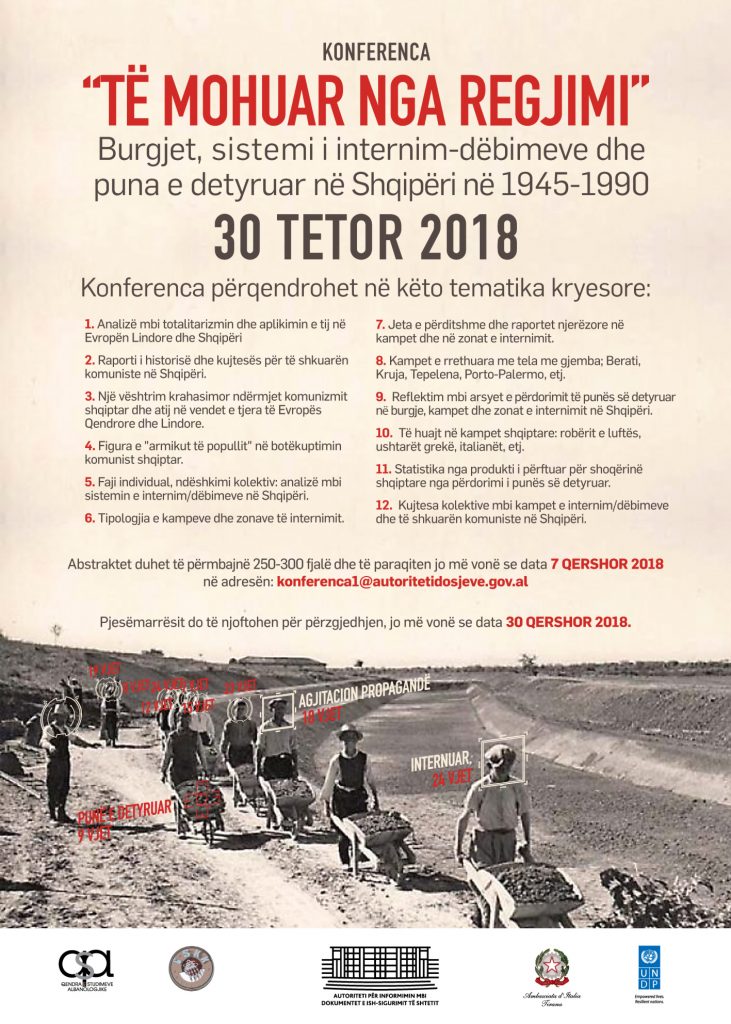Among the issues in the relationship of Albanian society with the communist past, the discourse on the repressive part of the regime seems to be the most difficult component. Public opinion shows a kind of refusal to engage in debates about the multifaceted violence exercised by the regime against its political opponents and their families, about the prison system and that of internment/expulsions, about the suffering of people in these prisons and camps, and the many abuses they endured there.
Forced labor was widely used in communist Albania immediately after the establishment of the regime. Labor camps were places where punishment was carried out through forced work such as land reclamation, construction of public works, mineral extraction, agriculture, and so on. These camps were often built near the places where prisoners were required to work. Such camps were temporary (constructed with tents or barracks, surrounded by barbed wire, and strictly controlled by armed soldiers), while in other cases they were established permanently, especially near mines. The first labor camps for prisoners were those in Juba, near Durrës (1946); Maliqi near Korçë (1946); Bedeni and Lekaj near Kavajë (1948); Valshuk, Berat (1948), and many others. Forced labor was also applied in internment sites during the period 1945-1953. All internees, regardless of whether they were men, women, elderly, or children, lived in places surrounded by barbed wire and were forced to perform extremely hard work. Such labor camps for internees existed in Tirana, Tepelenë, Cërrik, and other locations.
Labor camps for prisoners were the most painful phenomenon of the communist regime. A 1955 report by the U.S. Department of State addressed to the United Nations expresses serious concerns about the use of forced labor in prisons and internment camps in Albania. According to the report, “forced labor has been widely used in Albania since the current communist regime came to power in November 1944. A number of laws and decisions have been issued legalizing forced labor, and the new Albanian Penal Code adopted in May 1952, based on the Soviet Penal Code, skillfully provides for ‘corrective labor’ and the internment of citizens in concentration and labor camps. Even children who have reached the age of 12 are held responsible under measures for placement in ‘corrective labor’ camps if accused of crimes against the state.”
During the 28 years following the fall of the communist regime in Albania, the community of researchers has not focused much on these delicate issues. Serious studies on forced labor and the internment-expulsion system are lacking in Albania; memorial sites about the communist regime have not yet been established; genuine scientific activities on these matters have not been developed, and only recently has systematic work begun to collect testimonies and memories of people who suffered in prisons and internment camps.
Convinced that only by approaching the past with courage, scientific objectivity, and empathy do we serve the emancipation of Albanian society,
Authority for Information on the Files of the Former State Security,
in cooperation with
The Institute of History at the Academy of Albanological Studies,
The Institute for the Study of Crimes and Consequences of Communism and
The Institute for the Integration of Former Political Persecuted Persons
invite you to submit proposals for presentations for the conference “Denied by the regime”: prisons, the internment-expulsion system, and forced labor in Albania 1945-1990,” which will be held on October 31, 2018, in Tirana.
This conference is organized within the framework of the project “Remembering to Heal and Prevent,” supported by the Authority for Information on the Files of the Former State Security. The project is supported by UNDP Albania and the Government of Italy.
The conference focuses on the following main themes:
Abstracts must contain 250-300 words and be submitted no later than the date June 7, 2018 to the address:
konferenca1@autoritetidosjeve.gov.al
Participants will be notified of selection no later than the date June 30, 2018.
Organizing Committee:
Academician Beqir Meta (ASA)
Dr. Marenglen Kasmi (AIDSSH)
Dr. Adriana Topi (AIDSSH)
Prof. Asoc. Dr. Sonila Boçi (ASA)
Dr. Çelo Hoxha (ISKPK)
